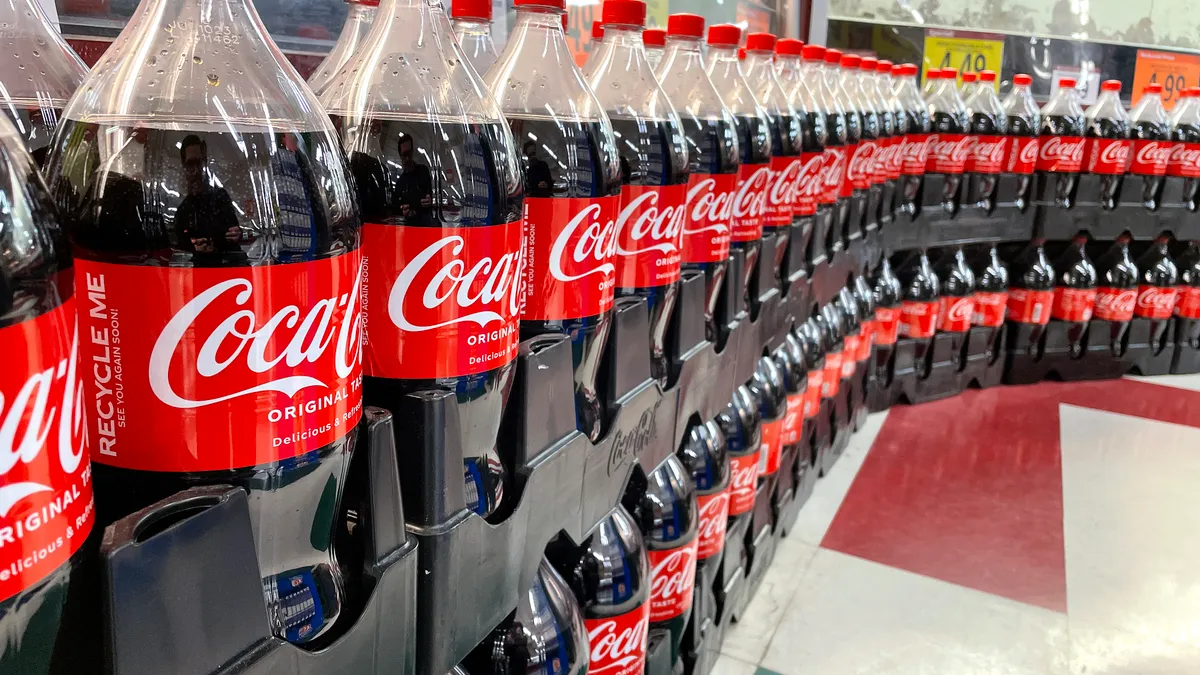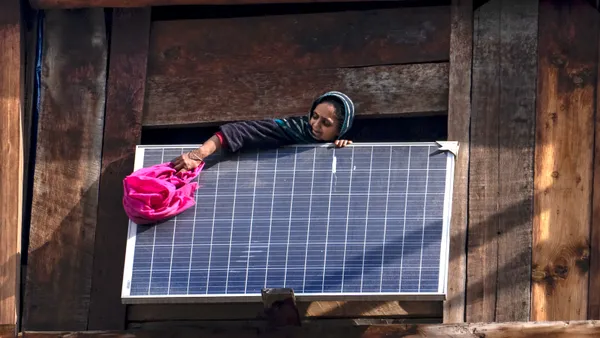Dive Brief:
- The District of Columbia Court of Appeals ruled last week that Coca-Cola must face a lawsuit alleging it deceptively marketed the role sustainability plays in its business strategy.
- The lawsuit was brought by environmental nonprofit the Earth Island Institute and dismissed by the D.C. Superior Court in 2022. The appeals court said in its reversal of that ruling that Earth Island had “stated a facially plausible misrepresentation claim” when it alleged the company’s statements overstate its work sustainability and undersell its environmental impact.
- The complaint was originally filed in June 2021. Now, Coca-Cola and the Earth Island Institute will re-litigate this case in the D.C. Superior Court to determine whether the company’s statements on its sustainability and recycling efforts, when compared to its impact, constitute deceptive marketing practices under the District’s consumer protection law.
Dive Insight:
As part of the lawsuit, Earth Island compiled a list of public statements and sustainability targets, including the beverage company’s goals to make their packaging 100% recyclable by 2025, use 50% recycled material by 2030 and recycle one can for each it sells by 2030. Coca-Cola argued that its statements were “classic puffery” and the group “improperly target[ed] a mosaic of statements that were about its corporate ethos and not its goods or services, according to the reversal.
A panel of federal appeals court judges found the beverage company’s counterarguments “unpersuasive,” but emphasized that they “do not offer any view of the veracity of Earth Island’s claims,” in their decision. The judges also conceded in their opinion that they don’t “presume to know” whether a reasonable consumer understands what it means when companies say they are “working to be ‘more sustainable.’” However, they said it is not “obviously true” that a consumer would immediately dismiss it “as vacuous corporate jargon, not to be relied on.”
“Earth Island has plausibly alleged that Coca-Cola’s statements, when viewed in their surrounding context, mislead consumers into believing that it is an environmental steward, when it is in fact an environmental scourge,” Associate Judge Joshua Deahl wrote in the opinion. “Whether Earth Island can ultimately substantiate those claims is a different question for another day.”
The judges said Earth Island has plausibly alleged that Coca-Cola’s continued reliance on “single use plastics on a massive scale makes it so fundamentally unsustainable” that efforts to market its efforts to “marginally offset” its impact are fundamentally a distraction.
“Coca-Cola represents itself as a company that is focused on working toward a more sustainable environment,” the decision said. “Earth Island plausibly alleges that Coca-Cola’s actions in mass producing single-use plastics, with no intention of stopping or significantly curtailing that production, tell a wildly different story.”
The panel of judges also found Earth Island made plausible allegations that the beverage giant misleads consumers about the extent recycling can offset the impact of the company’s plastic production and has misled consumers about its intentions to hit its announced recycling targets.
Earth Island Institute CEO Sumona Majumdar said in a press release Wednesday that the organization is “encouraged” its lawsuit can continue.
“Coca-Cola knows that consumers care about the environment and consequently the company takes every opportunity it can to convince consumers that it cares as well,” Majumdar said in the release. “And yet for decades they have failed to do the one thing that would help align their actions with their words, which is reduce their use of plastic packaging.”
“The D.C. Court of Appeals correctly found that Earth Island can challenge Coca-Cola's sustainability statements under the District's consumer protection laws,” Majumdar said in emailed comments to ESG Dive Wednesday. “Earth Island looks forward to further shedding light on how these statements mislead consumers."
A recent analysis of companies’ plastic pollution prevention actions and commitments by As You Sow, a corporate social responsibility nonprofit, gave Coca-Cola and Keurig Dr. Pepper each a “B” grade for their efforts. While Coca-Cola was deemed more ambitious, Keurig Dr. Pepper was graded higher on its overall action. A circular economy expert for As You Sow said that, overall, “companies do not appear to be on track” to meeting their 2025 targets.
Coca-Cola launched its World Without Waste packaging sustainability strategy in 2018, and the company says on the initiative’s landing page that it is “leveraging [its] scale and reach across markets to reach [its] sustainability goals.
“The interconnected global challenges of packaging waste and climate change have made this a focus for our business and communities,” per the landing page. “Our company and our bottling partners are taking a hard look at the packaging we use and how we can drive change.”
The District of Columbia’s attorney general and solicitor general wrote amicus briefs in support of Earth Island’s claim, while the National Association of Manufacturers, the Chamber of Commerce and Consumer Brands Association supported Coca-Cola’s argument, according to court records.
Coca-Cola did not respond to a request for comment in time for publication.











